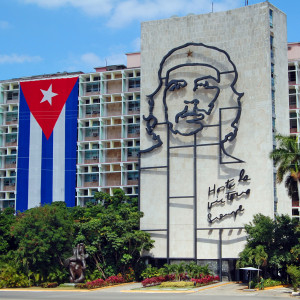Two weeks after President Donald Trump announced a rollback of U.S.-Cuba policies from the heart of Miami’s Little Havana, U.S. corporations are wary and at a standstill, wondering how the announcement will translate into regulations over the course of the next month.
When rumors surfaced that Trump would announce a change to the existing policy, many expected a hard-hitting reversal of the Obama-era opening. What came about was a toned-down proposal to block incoming funds that may benefit the Cuban military and limitations on U.S. people-to-people travel to the country, unless organized in group by a licensed tour operator.
Pressuring the Cuban government to respect human rights seems to be at the heart of Trump’s motivations on Cuba. But while Trump’s policy change may have been well intended, his black and white approach to this issue is reflective of antiquated, polarizing Cold War-era narratives.
Proven ineffective in stemming the Cuban government’s violations for 54 years, a rollback of the opening after only two and a half years of engagement is unwise and will hurt both American businesses and, perhaps more important, Cuban entrepreneurs who are fountains of change on the island.
Though not as far-reaching as possible, Trump’s Cuba directive fails to account for complexities — in this case relating to the nature of economic activity on the island. Few parts of the Cuban economy are completely independent of state control.
The Grupo de Administracion Empresarial, or GAESA, owns an estimated 60 percent of all commerce, including restaurants, rental cars and imports. Spearheaded by Luis Alberto Rodriguez, Raul Castro’s son-in-law, GAESA is at the core of Cuba’s public and private sectors — and will remain so for the foreseeable future, whether the United States has a presence on the island or not.
Inevitably, U.S. investments in Cuba pool some money in the hands of GAESA. But, more dollars benefit the Cuban cuentapropistas, or entrepreneurs. In them is where the opportunity for change lies.
The huge influx of U.S. tourism to Cuba has paved avenues for new jobs in the country. With 22,000 properties listed, Airbnb is a leading example of this wave of opportunity. With the spirit of entrepreneurship on the rise, backpedaling on engagement now will prove detrimental to Cubans’ ability to be further empowered and to advocate for change.
Rather than achieving the intended outcomes, the limitations are likely to scare off U.S. businesses looking to invest in the island, stifling the continuous transition to reform that Cubans and Americans seek.
So, what can U.S. businesses and policymakers do next?
The hope lies with influencing the regulatory process that will soon begin and that will lay out exactly how the president’s announcement will be enacted. Per the policy, the departments of Commerce and Treasury will spell out the exact nature of the prohibitions on U.S. financial transactions with the military intelligence and security services.
Here, the departments must generate clear-cut, specific guidelines that will limit uncertainty and confusion — ambiguity on the regulation side will be detrimental to businesses looking for a foothold.
Regulations must identify these limitations with precision. If the administration plans to announce a “blacklist” of companies tied to the Cuban military, it must do so carefully and considerately, accounting for how such ties will be measured. Can U.S. tourists buy from military-owned souvenir shops? Can they rent a car from a state-run company? Such questions must be answered.
Does the buck stop here?
Though this new rollback has little chance of effecting positive long-term change, the Trump administration must let the dust settle on Cuba before churning the pot again. It cannot expect that these limitations will change the government’s stances overnight. But more important, it should not create on and off waves of uncertainties for U.S. businesses.
The road to change in Cuba is not through the path of most resistance. This has been tried by the United States, and clearly failed. If the Trump administration means to affect human rights on the island, and provide advantages to the private sector, it must let businesses effect change from the bottom up. Engagement is the answer — and, if limitations are to be enacted, at the very least let them be clear and consistent.

